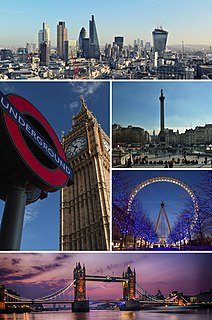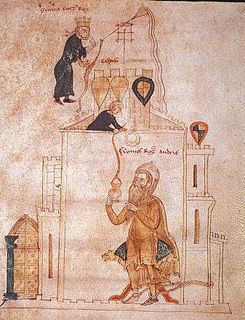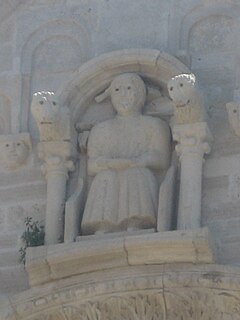This article includes a list of references, related reading or external links, but its sources remain unclear because it lacks inline citations .(June 2013) (Learn how and when to remove this template message) |
Grimoald Alferanites was the prince of Bari from 1121 to 1132.
A prince is a male ruler ranked below a king and above a duke or member of a monarch's or former monarch's family. Prince is also a title of nobility, often hereditary, in some European states. The feminine equivalent is a princess. The English word derives, via the French word prince, from the Latin noun princeps, from primus (first) and capio, meaning "the chief, most distinguished, ruler, prince".
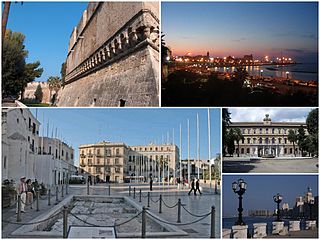
Bari is the capital city of the Metropolitan City of Bari and of the Apulia region, on the Adriatic Sea, in southern Italy. It is the second most important economic centre of mainland Southern Italy after Naples and Palermo, a port and university city, as well as the city of Saint Nicholas. The city itself has a population of 326,799, as of 2015, over 116 square kilometres (45 sq mi), while the urban area has 750,000 inhabitants. The metropolitan area has 1.3 million inhabitants.
After a civil war broke out in Bari, Risone, the archbishop of the city, was murdered (1117) and the princess of Taranto, Constance of France, was imprisoned at Giovinazzo (1119) by Grimoald and Alexander, Count of Conversano. Pope Callistus II intervened to procure the release of Princess Constance in 1120, who recognised her captor in his later titles. During this conflict, Grimoald was elected ruler in 1121, in opposition to William II, Duke of Apulia, the proper legal suzerain of Bari. He first used the title dominus or dominator, as in barensium dominator in October 1121. In June 1123, a Byzantine-inspired blue diploma with gold script calls him Grimoaldus Alferanites gratia Dei et beati Nikolai barensis princeps.

Constance of France was the daughter of King Philip I of France and Bertha of Holland. She was a member of the House of Capet and was Countess of Troyes from her first marriage and Princess of Antioch from her second marriage. She was regent during the minority of her son.
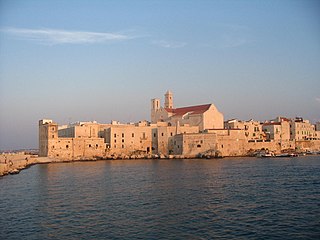
Giovinazzo is a town, comune (municipality) and former bishopric within the Metropolitan City of Bari, Apulia region, southeastern Italy.
Alexander was the second count of Conversano (1085–1132), the son and successor of Geoffrey the Elder.
In May 1122, he entered into an alliance with the Republic of Venice. In October 1127, he was drawn to the side of Roger II of Sicily in his claim to the Apulian succession. However, in 1129, Grimoald and several other notable barons in Apulia flew into revolt after the papal approval of Roger's title by Pope Honorius II. With a fleet of sixty ships, George of Antioch blockaded the Bariot harbour and besieged Grimoald for months from Spring to August, when the prince finally gave in. Nevertheless, Grimoald was granted a full pardon from Roger and confirmed in his own chosen princely title. When, the next year (1130), Roger sought the royal title, receiving an honour higher than that of prince (as the rulers of Capua and Bari held) was one of his many motives.

The Republic of Venice or Venetian Republic, traditionally known as La Serenissima was a sovereign state and maritime republic in northeastern Italy, which existed for over a millennium between the 7th century and the 18th century from 697 AD until 1797 AD. It was based in the lagoon communities of the historically prosperous city of Venice, and was a leading European economic and trading power during the Middle Ages and the Renaissance.

Roger II was King of Sicily, son of Roger I of Sicily and successor to his brother Simon. He began his rule as Count of Sicily in 1105, became Duke of Apulia and Calabria in 1127, and then King of Sicily in 1130. By the time of his death at the age of 58, Roger had succeeded in uniting all the Norman conquests in Italy into one kingdom with a strong centralized government.

Pope Honorius II, born Lamberto Scannabecchi, was Pope from 21 December 1124 to his death in 1130.
Joined with Tancred of Conversano, an old ally and renegade, Grimoald rose up in revolt in 1131 and captured the port of Brindisi at Christmastime. It took until May 1132, after astronomic omens and papal urgings, for Roger to leave comfortable Sicily to go and deal with insurrection in Apulia. A brief siege convinced the Bariots to give up their prince and Grimoald and his whole family were given over on the city's surrender. The deposed prince was brought with his family to prison in Sicily and Tancred was only forgiven on condition he leave on Crusade. Grimoald was replaced by Roger's own son, Tancred.
Tancred of Conversano, the youngest son of Geoffrey, Count of Conversano, became the count of Brindisi on his father's death.
The port of Brindisi is located in Brindisi, Italy. It is used for tourism, commercial and industrial shipping on the Adriatic Sea. Tourist traffic offer connections with the Balkan Peninsula and Turkey, while commercial concerns include coal, fuel oil, natural gas, and chemicals. For more than two millennia, the harbour has been involved in military and commercial operations.

Christmas is an annual festival, commemorating the birth of Jesus Christ, observed primarily on December 25 as a religious and cultural celebration among billions of people around the world. A feast central to the Christian liturgical year, it is preceded by the season of Advent or the Nativity Fast and initiates the season of Christmastide, which historically in the West lasts twelve days and culminates on Twelfth Night; in some traditions, Christmastide includes an octave. Christmas Day is a public holiday in many of the world's nations, is celebrated religiously by a majority of Christians, as well as culturally by many non-Christians, and forms an integral part of the holiday season centered around it.
According to Falco of Benevento, Grimoald was a vir mirabilis et bellicosi spiritus and Orderic Vitalis calls him liberalem et strenuum virum. It seems, from the dating of the events, that the prince of Bari who rescued the saintly Giovanni di Matera from prison and then demanded that the holy man give an account of his theology to prove its orthodoxy was Grimoald. He was known to have tight control over his own churches and was a great patron of the Church of Saint Nicholas which housed the relics of Saint Nicholas, whom he championed as a Bariot patron saint, as seen in his official title.
Falco of Benevento was an Italian twelfth-century historian, notary and scribe in the papal palace in Benevento, his native city, where he was born to high-standing parents.

Orderic Vitalis was an English chronicler and Benedictine monk who wrote one of the great contemporary chronicles of 11th- and 12th-century Normandy and Anglo-Norman England. Modern historians view him as a reliable source.

Saint Nicholas of Myra, also known as Nicholas of Bari, was an early Christian bishop of the ancient Greek maritime city of Myra in Asia Minor during the time of the Roman Empire. He is revered by many Christians as a saint. Because of the many miracles attributed to his intercession, he is also known as Nicholas the Wonderworker. Saint Nicholas is the patron saint of sailors, merchants, archers, repentant thieves, children, brewers, pawnbrokers, and students in various cities and countries around Europe. His reputation evolved among the faithful, as was common for early Christian saints, and his legendary habit of secret gift-giving gave rise to the traditional model of Santa Claus through Sinterklaas.
| Preceded by none | Prince of Bari 1121–1132 | Succeeded by Tancred |

